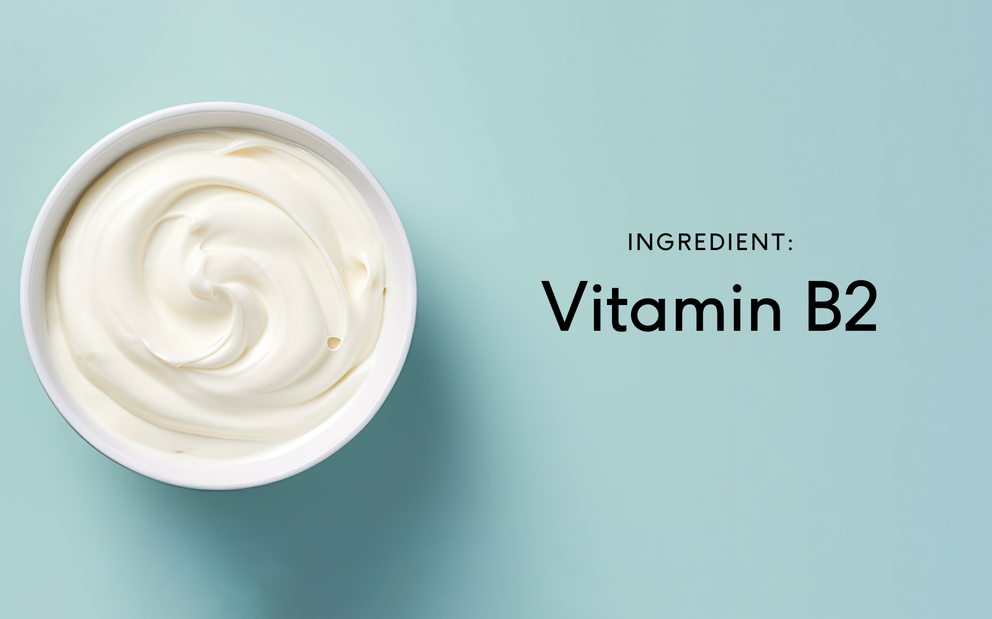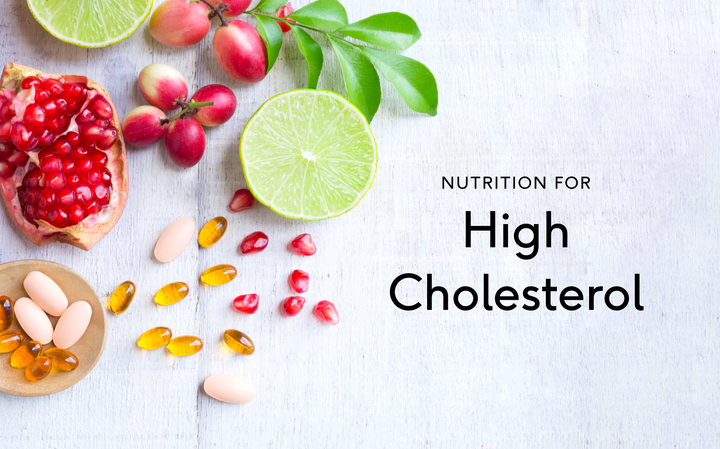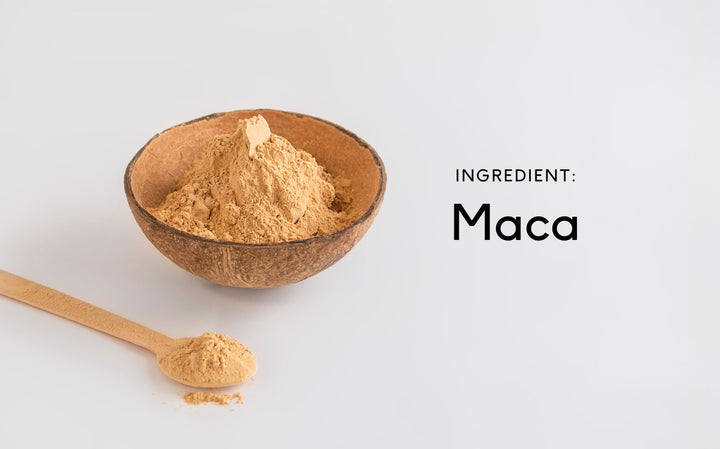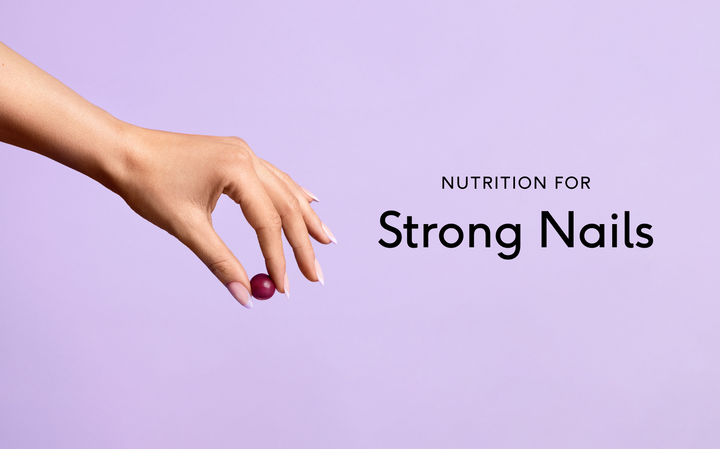Learn About Vitamin B2 in 5 Minutes
Table of contents

What is vitamin B2?
Vitamin B2, also known as riboflavin, is an essential component of the B vitamin complex. This vitamin helps you process energy, and it also promotes eye health, prevents headaches, and assists in the processing of iron and vitamin B12 to prevent anaemia.
- Prevents migraines and makes these crippling headaches a thing of the past
- Promotes glucose production to provide your body with extra energy
- Keeps your eyes healthy by synthesizing glutathione and preventing cataracts
- Processes iron and other B vitamins to make them easier for your body to digest
- Keeps you healthy throughout the later stages of pregnancy
Why we love vitamin B2
As part of the B vitamin complex, vitamin B2 helps your body produce glucose, which distributes energy to all your body’s tissues. Also known as riboflavin, vitamin B2 helps your lungs, liver, skin, heart, and brain develop and maintain themselves effectively, and this nutrient has several unique benefits that make it an irreplaceably important part of your diet.
Vitamin B2 appears to reduce the levels of homocysteine in your blood, which is a harmful amino acid that can cause cardiac conditions. Plus, this vitamin seems to improve your eye health, help your body process certain vitamins and nutrients, and treat conditions that can make pregnancy uncomfortable. With all these benefits in mind, we realised that we just had to include 100 percent of your daily dose of riboflavin in Feel.
Unbelievable benefits of vitamin B2
Scientific research has firmly established several important benefits of vitamin B2. Here are some of the most impressive ways that getting the right dose of riboflavin can improve your health and well-being:
Migraine Benefits
If you suffer from migraines, you need to make sure that you consume enough riboflavin every day. People who ingest lots of riboflavin have significantly less risk of experiencing migraines, and some studies found that nearly 70 percent of people who supplemented with vitamin B2 experienced less than half as many migraines as they did before supplementation.
Since riboflavin helps your body produce glucose, supplementing with this essential nutrient can improve your overall brain functioning. Your brain is one of the most glucose-demanding organs in your body, and it needs lots of glucose-rich blood to perform properly.
Eye Benefits
Glutathione is one of the most potent antioxidants in the body, and this antioxidant is especially necessary for proper eye health. According to research, your body can’t produce glutathione without riboflavin, so if you don’t consume enough vitamin B2, you won’t have enough glutathione in your body to protect your eyes from oxidative stress and inflammation.
The U.S. National Library of Medicine (NLM) points out that riboflavin appears to prevent cataracts, and a study pointing out that A and B vitamins protect your eyes from cataracts supports this position.
Pregnancy Benefits
During the later stages of pregnancy, many women experience a condition called preeclampsia, which causes dangerously high blood pressure. Research indicates that riboflavin supplementation reduces the symptoms of preeclampsia, which could make the intimidating last few weeks of pregnancy safer and more comfortable for women who develop this condition.
The B vitamins are also essential for supporting baby's brain development during pregnancy, so we've included 10mg of Vitamin B2 in Feel Pregnancy.
Other Benefits
The B vitamins work best in unison, and vitamin B2 helps your body process vitamins B6 and B9. Interestingly, riboflavin also appears to help your body process iron, which means that this nutrient might prevent anemia.
Vitamin B2 also seems to reduce levels of homocysteine in your blood, which is a natural amino acid that can cause heart disease when it gets out of hand. What’s more, your brain has very little trouble absorbing riboflavin, which could increase its effectiveness. Some researchers have even looked into using vitamin B2 as a carrier for other drugs that traditionally have trouble penetrating the brain’s tissue barriers.
Is vitamin B2 water-soluble or fat-soluble?
Like all the B vitamins, riboflavin is water-soluble. Therefore, your body processes this nutrient quickly, and it doesn’t build up in your system.
Where can vitamin B2 be found naturally?
Non-animal sources of vitamin B2 include mushrooms, almonds, and quinoa. It's also highly concentrated in organ meats and dairy.
5 foods/drinks containing vitamin B2
1. Beef liver 171% DV per 85g
2. Yoghurt 35% DV per 1 cup or 128g
3. Milk 29% DV per 1 cup or 128g
4. Mushrooms 18% DV per ½ cup or 64g
5. Almonds 18% DV per 28g
What is the recommended daily intake for vitamin B2?
According to the National Institutes of Health (NIH), adult men should consume 1.3mg of riboflavin per day, and adult women should consume 1.1mg. Pregnant women should consume 1.4mg, and lactating women should consume 1.6mg.
What to consume to get a full daily dose of vitamin B2?
Beef liver - approximately 56g
Yoghurt - approximately 3 cups or 384g
Milk - approximately 3 cups or 384g
Mushrooms - approximately 3 cups or 384g
Almonds - approximately 170g
Can you absorb enough of vitamin B2 from food?
People on meat-free diets may have trouble getting enough riboflavin from food. While this substance is present in most dairy products, plant-based sources of vitamin B2 don’t contain very much of this essential nutrient.
Why is vitamin B2 necessary for your body?
Riboflavin serves as the backbone of the B vitamin complex. It helps your body process the other B vitamins you consume, and it also assists in the breakdown of dietary iron. Plus, vitamin B2 serves critical roles in eye health, neurological well-being, and healthy pregnancy.
Functions of vitamin B2
Energy distribution: All the B vitamins play critical roles in converting nutrients into glucose, and vitamin B2 helps your body create this energy-providing substance that’s so essential for overall health and well-being.
Ocular health: Your body uses vitamin B2 to create glutathione, which helps prevent oxidative stress in your eyes. Riboflavin may even be able to prevent cataracts.
Migraine treatment: Supplementing with vitamin B2 may be able to reduce the frequency and severity of migraines and other types of headaches.
Reproductive functions: Riboflavin appears to prevent preeclampsia, which is a condition that causes heightened blood pressure during pregnancy.
Symptoms of vitamin B2 deficiency
Mouth Sores
Riboflavin deficiency causes a variety of conditions in or around your mouth. When you don’t consume enough vitamin B2, you might develop sores on your lips and at the corners of your mouth, and redness and swelling in your throat and mouth may also occur.
Dermatitis
Deficiency in riboflavin causes seborrheic dermatitis, which is characterised by moist, scaly rashes on your skin.
High Blood Pressure While Pregnant
Riboflavin deficiency during pregnancy can cause preeclampsia, which results in heightened blood pressure, swelling, and increased urine protein content.
How long do you need to take vitamin B2 to start experiencing its benefits?
Since riboflavin is water-soluble, it usually doesn’t take long for your body to start experiencing the benefits of this nutrient.
Consistency is key and our research recommends taking your Feel Supplements for at least 3 months to allow your body to adjust and provide the desired benefits.
How long does it take for your body to digest/absorb vitamin B2?
According to scientific research, all forms of natural dietary riboflavin have equal absorption rates. Your body absorbs this nutrient very quickly, and in most cases, nearly 100% of ingested riboflavin is absorbed.
How long does vitamin B2 stay in your body after you take it?
Your body processes riboflavin and excretes this nutrient almost immediately.
Is vitamin B2 an antioxidant?
Since riboflavin is essential for the production of glutathione, it is an antioxidant, and some research indicates that this vitamin has antioxidant activity independent of the production of glutathione. Therefore, it helps your body fight back against free radicals and reduce oxidative stress and inflammation from multiple angles.
Can you overdose on vitamin B2? What are the effects?
Riboflavin toxicity is incredibly rare. Since your body processes this nutrient so quickly, it’s almost impossible to build up the riboflavin levels necessary to cause toxicity. Temporary symptoms of riboflavin overdose may include nausea, diarrhoea, and vomiting as your body attempts to return concentrations of this nutrient to normal levels.
Does vitamin B2 dissolve, flush out, or build up in the body?
Riboflavin does not build up in your body to any significant degree. Instead, it’s excreted rapidly.
Can you take vitamin B2 during a diet?
Consuming riboflavin in food or supplement form does not interfere with any dietary restrictions.
Are there synthetic forms of vitamin B2?
The riboflavin found in fortified foods is synthetic, and this type of vitamin B2 has lower absorption rates. Synthetic riboflavin is created by fermenting GMO bacteria, and your body flushes it out like a toxin.
Why might synthetic forms of vitamin B2 be better?
The only potential advantage of synthetic riboflavin would be reduced cost. The body does not process this nutrient as well as natural vitamin B2.
Absorption rate of synthetic vitamin B2
Synthetic vitamin B2 has a poor rate of absorption as compared to natural riboflavin.
Why might natural forms of vitamin B2 be better?
Your body reacts better to natural riboflavin, and it’s not clear whether artificial forms of this vitamin are safe.
How to take vitamin B2
You can either take this vitamin by consuming riboflavin-rich foods or by taking a multivitamin that contains riboflavin.
Vitamin B2 trends in medicine
A 2019 study supports riboflavin’s action as an antioxidant, and this research even suggests that vitamin B2 may be able to return reduced dopamine levels to their usual concentrations. In addition, scientists recently looked into the potential of riboflavin as a drug transporter; since this mineral already helps your body transport energy, researchers found this application worth looking into, and it turns out that vitamin B2 shows significant promise as a drug transportation agent. Riboflavin may, therefore, be able to replace dangerous or outdated drug transportation mechanisms.
Why everyone should be taking WeAreFeel supplements
Even if you consume animal products, B vitamins can be hard to source, and vegans and vegetarians historically have had a lot of trouble with getting enough B vitamins just from food. Anaemia is a common problem for people who don’t eat meat, and this condition only becomes exacerbated when you don’t consume enough vitamin B2 to provide adequate iron processing.
Here at WeAreFeel, we make things easy and provide you with the exact amount of riboflavin you need to stay healthy whether you don’t eat meat or you’re just too busy to sit down to three square meals per day.
Feel Multivitamin provides 5mg of Vitamin B2, ideal for supporting anaemia and fatigue, and providing you with all the Vitamin B2 you need.
Here’s the Proof
- High-dose riboflavin treatment is efficacious in migraine prophylaxis: an open study in a tertiary care centre.
- Riboflavin prophylaxis in pediatric and adolescent migraine
- Glutathione reductase activity, riboflavin status, and disease activity in rheumatoid arthritis
- Riboflavin (U.S. National Library of Medicine)
- Use of vitamin supplements and cataract: the Blue Mountains Eye Study.
- Riboflavin deficiency and preeclampsia.
- Riboflavin (vitamin B-2) and health
- Riboflavin supplementation and biomarkers of cardiovascular disease in the elderly.
- Molecular and functional characterisation of riboflavin specific transport system in rat brain capillary endothelial cells.























































 Back
Back





